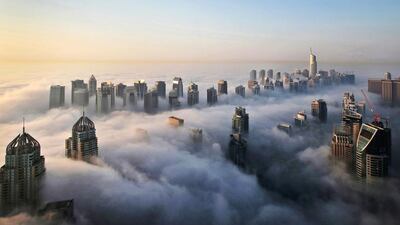Dubai’s economy grew in December, but at its slowest pace for more than five years as real estate, construction and retail were hit by the stronger US dollar, lower public spending and falling consumer demand in the Arabian Gulf.
Dubai’s economy registered a score of 51.8 in the Dubai Economy Tracker, a monthly survey of businesses. That is the lowest score recorded by the index since July 2010. Any score above 50 indicates that the economy is expanding.
The emirate’s real estate sector continued to slow in the third quarter of the year. Data from the Dubai Real Estate Tracker, a monthly survey of estate agents, showed that buyer inquiries and transactions fell in the last three months of 2015.
Real estate and construction account for about 21 per cent of GDP, according to Dubai Department of Economic Development.
“Dubai will slow, along with the region’s other countries, as fiscal consolidation in the UAE and the rest of the Gulf weakens economic activity,” said Jason Tuvey, an emerging markets economist at Capital Economics.
Gulf governments have trimmed spending as they seek to cope with the collapse in oil prices. The UAE has cut spending by 15.8 per cent in the three months to September against the previous year, Central Bank data show. Saudi Arabia plans to trim spending by 14 per cent next year.
That is hurting the public sector and the private sector. The IMF says that corporate profitability in the Gulf remains dependent on state spending.
The strong dollar has also hit the Dubai economy.
The dollar hit a five-year high against global currencies in November ahead of the Fed’s December rate rise. It has dipped marginally since then but remains close to its peak.
That has pushed up real estate prices in Dubai for foreign buyers and dented the enthusiasm of tourists and shoppers faced with higher sticker prices.
The trade and logistics sector, which accounts for 48 per cent of Dubai’s economy, may also have slower growth as global trade flows slow.
Merchandise trade recorded its slowest growth rate in the third quarter of 2015 since the middle of 2014, according to the United Nations Conference on Trade and Development Data. Overall global merchandise trade is growing significantly slower than before the 2008 crash.
That could be bad news for Dubai’s ports infrastructure, which promises to be the largest source of growth in the emirate up to 2020. Trade and logistics account for just under half of the Dubai GDP.
A slowdown in China, Dubai’s largest trading partner, will also hit the sector. China is moving from an investment-led economy with closed capital markets, towards consumer-driven growth and relatively more open capital markets.
But consumer spending power is proving to be a weak foundation for China’s growth rate, with unofficial data pointing to slowing economic activity in the country. Chinese stocks suffered a second major rout last week, the second in six months. The Shanghai composite has fallen 15 per cent in the past 11 days.
“The slower rate of expansion in Dubai in December is unsurprising given the headwinds of strong US dollar and increased uncertainty about both the global and regional economic outlook,” said Khatija Haque, the head of Middle East and North Africa research at Emirates NBD.
abouyamourn@thenational.ae
Follow The National's Business section on Twitter

